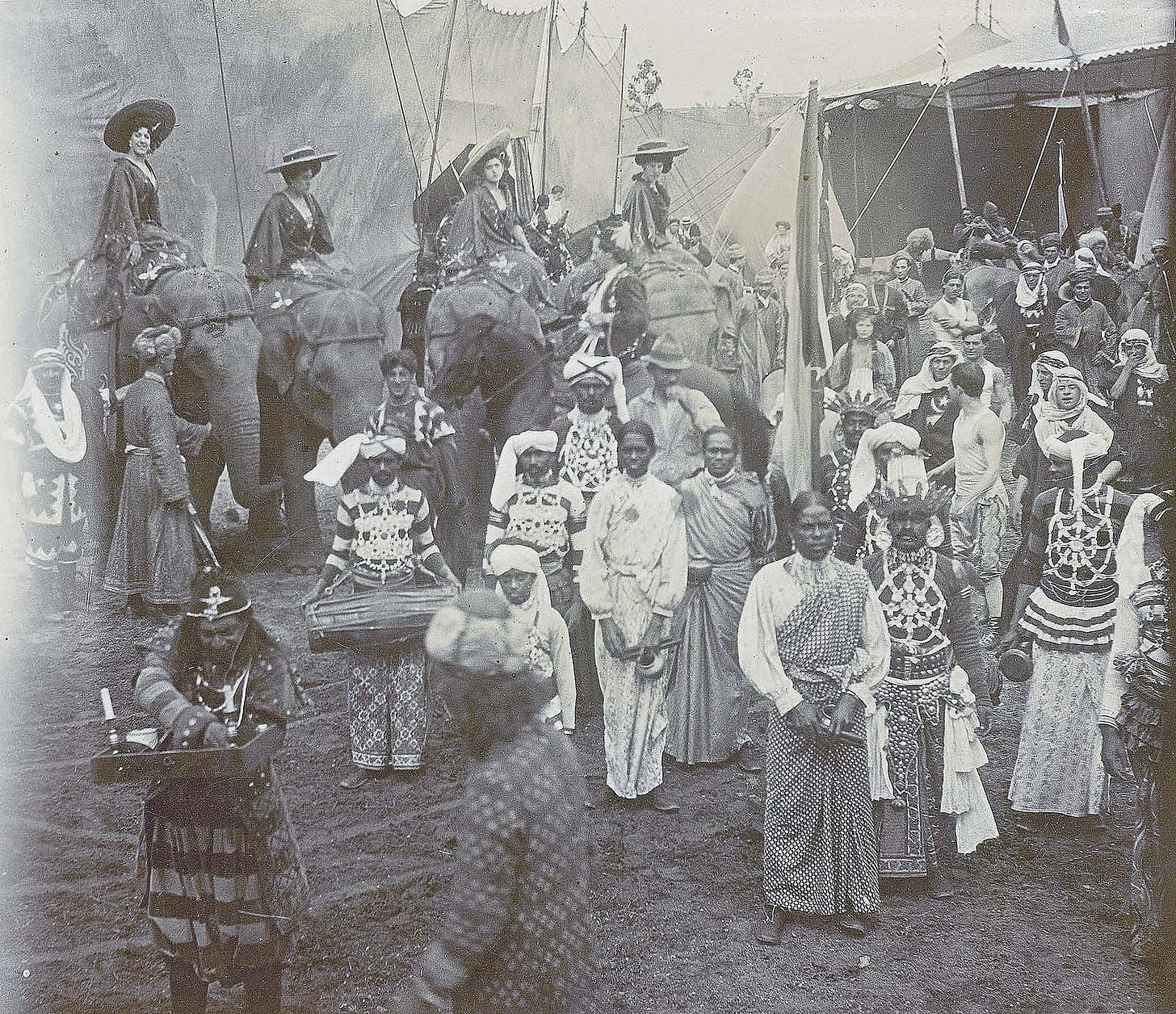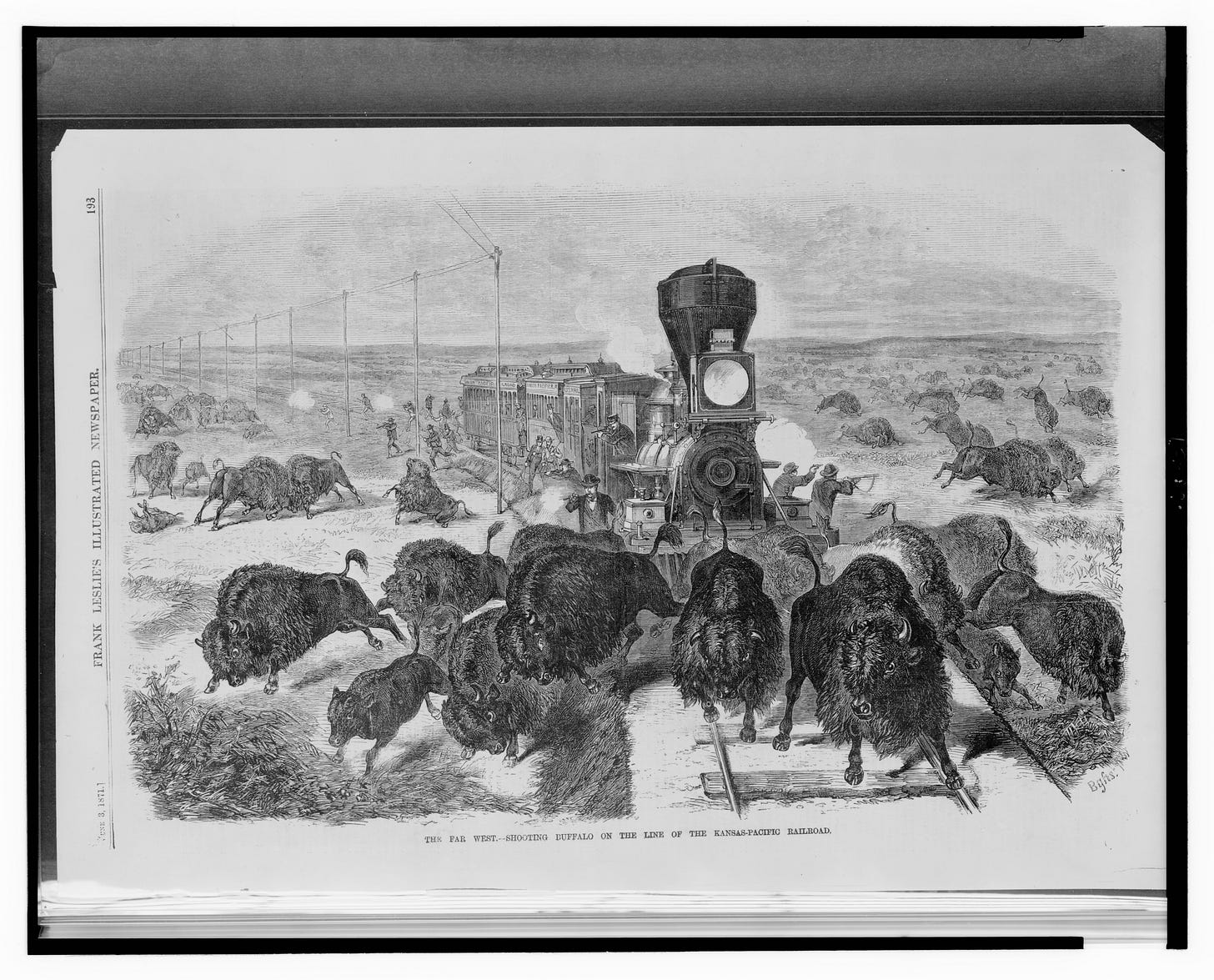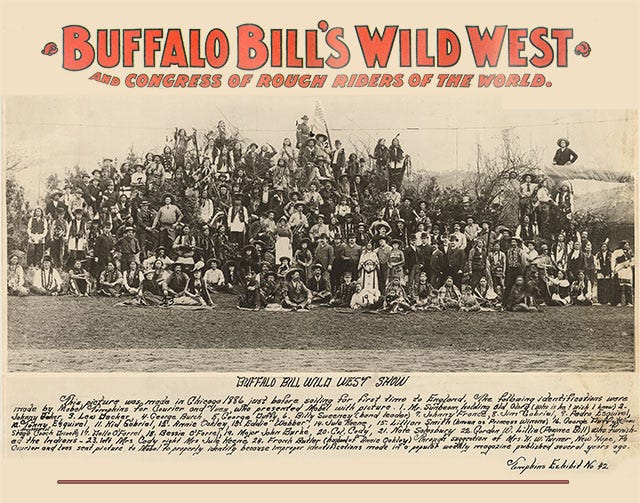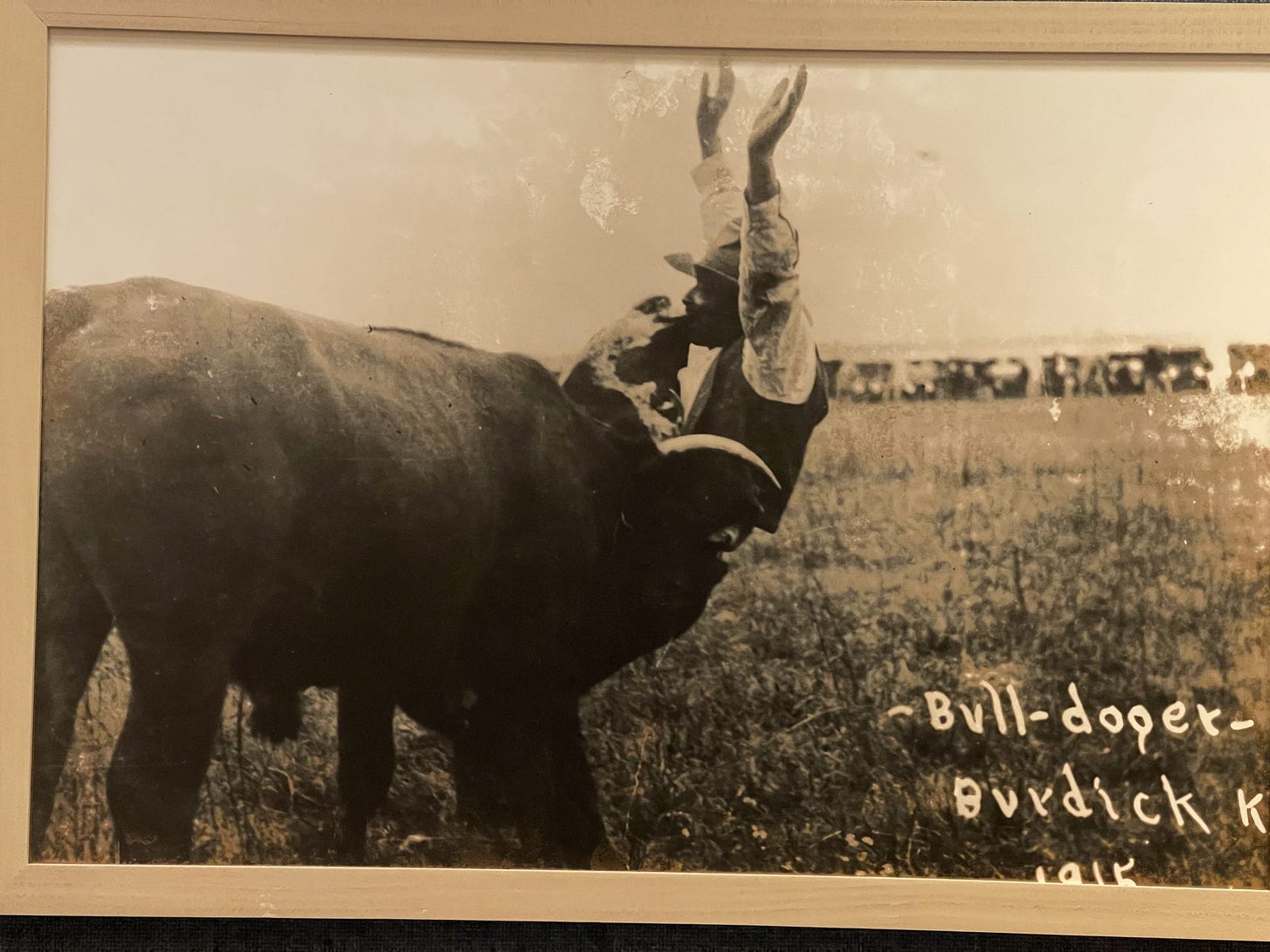The buffalo in Wild Will’s Wild West Show were the first buffalo Owen ever saw. Sure, he’d heard about the herds that once turned the plains black. But William “Wild Will” Dockett explained that much of the money Will saved to create his traveling show came from killing buffalo for the Kansas Pacific Railroad to feed its laborers. Will said he killed more than five thousand buffalo that way. But the buffaloes’ days were numbered once the railroad was complete. Then the railroad companies advertised buffalo hunting parties for Easterners. In one day, Will watched men on trains with guns kill more than twelve hundred buffalo.
By the time Owen joined Will’s Wild West Show, the show employed three hundred cast and staff members, including twenty cowboys, six cowgirls, and fifty Indian men, women, and children, and one shootist. The show fed them all three times a day, and they lived in a small traveling city of wall tents and twenty-foot-long cooking ranges. Will never stopped complaining that the whole set-up cost him more than two-thousand dollars a day, but Owen could not deny that Will did not lack for customers. Taming the west in a traveling show was a popular business.

So, at this very moment, the screaming women and children and cheering men in the wooden benches that encircled the corral were excited to see Homesteader Husband Owen protect his Homesteader Wife Marianne by roping the wild buffalo that charged their covered wagon as they crossed the Missouri River toward Dakota Territory. The problem was the bull that pawed at the ground a hundred feet from the wagon was not the gentle, almost timid cow Owen had worked with the last ten times he had done this show. The patrons thought it was part of the show, but somehow, this bull had taken the cow’s place. It had been over two years since Owen roped a steer, and this buffalo was bigger than any steer Owen had ever faced.
Still, Owen could not help but admire the massive bulk and strength of the creature as its hoof hit the packed dirt with a solid thud that rippled through its massive shoulder muscles to its hindquarters. Red dust floated in the air as the animal shook its woolly mane. Owen knew that if the bull hit the wagon full-on broadside, the wagon would not stand.
“Save me, my love,” Marianne yelled as she picked up the Winchester rifle next to his feet and shoved it into his hands. “Shoot him!”
Owen stared at Marianne. She only played an obedient wife in the show. She was as familiar with the ways of the west as he was, and she knew the rifle held ammunition only good enough for shooting turkeys. Ammunition for bringing down birds on the wing would be no match for a two-thousand-pound charging buffalo.
Which was what the buffalo did just then.
With a bellow that sounded like a gravelly lion’s roar, the buffalo lowered his head and pushed off his front legs, and charged the wagon with a speed Owen had to see to believe. So shocked was he that he forgot to fire the rifle. The buffalo hit the wagon, pushing it sideways. One of the buffalo’s horns stuck in the wagon wood, and it bellowed and shook its head as it tried to free itself. Women grabbed their children, and the men grabbed their guns. The wagon shook, and Marianne jumped off the other side and ran screaming toward the fence that encircled the corral. Owen reckoned she was anticipating the ‘death do us part’ part.
The buffalo ripped its horn from the wagon, busting a hole in the wood. It barely took a moment as it stepped backward, turned ever so slightly, and rammed inches from Owen and the horse. Owen’s horse's eyes were wide and wild, and the reins in his hand shook. With one hand on the reins, shushing the horse, he rotated his other wrist to decock the rifle. He could not outrun the buffalo. He would not hesitate to kill it to save his life. He would likely anger it even more with his birdshot. But he had nowhere to go.
Owen aimed the rifle at the buffalo.
And then a Negro in cowboy gear, roping gloves, and woolie chaps rode up around the back of the wagon, whipping a lasso in the air. As the buffalo freed itself from the wagon, stepped backward, and lowered its head for its next charge, the cowboy expertly dropped the lasso around the bull’s horns and pulled the buffalo’s head up. The bull shook its mighty mane and pulled back, but the cowboy wrapped the ends of the lasso around his arms as his horse danced backward, pulling that strong woolly head back with him. All Owen could do was stare.
The buffalo resisted, and a tug of war began between cowboy and animal. Owen kept his rifle trained on the buffalo, just in case, but the patrons had stilled their exodus and now watched the battle between man and beast with anticipation.
The buffalo had turned its full attention on the cowboy now. With its quick twitch front leg muscles, the buffalo hurled itself at the man. With a quick, graceful leap, man and horse parted ways. The horse turned away as the Negro jumped from the horse’s back, grabbed the buffalo’s horns midleap, and twisted the mighty head toward himself. As he loped alongside, holding the agitated bull, the crowd hollered in awe and excitement. The buffalo snorted and bucked, and the black cowboy held on, twisting the beast’s neck so it never could find its balance.
With his hold on the beast’s horns, the black cowboy pulled himself up to the buffalo’s mouth, almost as if he were to kiss the beast.
The cowboy bit the bull on the lips, and then held on as the startled buffalo snorted, and bucked, and shook its mighty frame.
A man wants to be good at something, Owen thought.
Owen had done many things he had never imagined in his life. He stowed away on a steamboat when he was fourteen, forded a river with a stampeding herd of cattle, survived a rattlesnake bite, survived a scorpion bite, and survived a prairie fire that killed his horse. But he had never seen anything like what the Negro cowboy did.
The crowd hooted as the startled and confused buffalo lost its stride, and the cowboy pulled it down onto its side. More cowboys rode out to rope the buffalo’s legs. Only when the bull’s legs were tied together did the Negro loosen his teeth from the bull’s lips.
Owen patted his horse's mane and gentled it with his voice as the horse snorted and danced in its reins. "It's all right, girl," he said softly and firmly. "It's all right."
As the horse calmed, Owen jumped from the wagon and approached the cowboy as he dusted himself off. “That was fine riding,” Owen said as he held out his hand. “Owen Lander.”
The other man pulled off his roping gloves, and they shook hands.
“Gilbert Donney,” the black man said.
Owen nodded his head to where the cowboys led the buffalo away. “What happened to the old cow?”
“Will thought we needed to make it more exciting,” Ray said as he gathered his horse’s reins. “When I saw your face, I figured Will didn’t get around to telling you about the change of plans.”
“Where did you learn to ride like that?”
“That ain’t nothing. You should see the real fella. Bill Pickett. I'll never be as good as him.”
“A man wants to be good at something,” Owen said. There was a man that could do something another man could not do.
Gilbert’s eyes widened, and he nodded. “That’s right.”
“How about a whiskey?” Owen asked. “My own personal brand.”
“Don’t mind if I do,” Gilbert said.
The two men walked around to the back of the wagon. Owen removed a jug and two glasses and poured them each a shot of whiskey.
"This is good whiskey," Gilbert said.
"Might be what I'm good at," Owen said and he realized he was grinning like a fool. Why should the world suddenly feel like a place in which he could make something of himself?
Gilbert nodded thoughtfully. "I'm going to the Territory. Putting together a Wild West Show of my own. For the homesteaders on the border. You heard about that?”
“About what?”
“The land run. For Indian Territory.”
“I’m not much for settling down,” Owen said, but he thought about his two covered wagons.
“What right-minded man is?” Gilbert said. “But they’s just sitting there, them homesteaders with everything they own. They can’t go nowhere, afraid someone’ll take their spot. And they sitting there with all the money they got in the world. You know what I call that?” Gilbert grinned. “I call that a paying audience.”
“Best kind,” Owen admitted.
“Chances are they get thirsty, too.”




